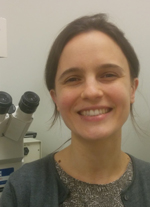Hannah Seidel

Education
- BA, Cornell University, 2005
- Ph.D., Princeton University, 2011
Interests and Expertise
The goal of my research is to understand how stem cells make decisions within living tissues. How do stem cells 'know' when to divide? How do tissues 'know' when they have grown to the right size? How are stem cell behavior and tissue growth regulated by physiological changes, such as changes in diet and reproductive state?We study these questions using the model organism C. elegans, a microscopic animal with a fast life cycle and simple body plan. Our research uses techniques in genetics, molecular biology, and cell biology.
I am always looking for talented, motivated students to join the lab. My goal as a mentor is to engage students in the scientific process and give students in-depth experience in molecular techniques. My expectation is that students will publish their research and learn to manage their projects independently.
Publications and Presentations
- Lee CH, Seidel HS, Lynch TR, Sorensen EB, Crittenden SL, Kimble J. 2017. Single-molecule RNA Fluorescence in situ Hybridization (smFISH) in Caenorhabditis elegans. Bio-protocol. 7(12): e2357. doi: 10.21769/BioProtoc.2357.
- Zdraljevic S, Strand C, Seidel HS, Cook DE, Doench JG, Andersen EC. 2017. Natural variation in a single amino acid substitution underlies physiological responses to topoisomerase II poisons. PLoS Genetics. 13(7):e1006891. doi: 10.1371/journal.pgen.1006891.
- Crittenden SL, Seidel HS, Kimble J. 2017. Analysis of the C. elegans Germline Stem Cell Pool. Methods in Molecular Biology. 1463:1–33.
- Seidel HS, Kimble J. 2015. Cell-cycle quiescence maintains Caenorhabditis elegans germline stem cells independent of GLP-1/Notch. Elife. 4:e10832. doi: 10.7554/eLife.10832.
- Kimble J, Bement WM, Chang Q, Cox BL, Drinkwater NR, Gourse RL, Hoskins AA, Huttenlocher A, Kreeger PK, Lambert PF, Mailick MR, Miyamoto S, Moss RL, O'Connor-Giles KM, Roopra A, Saha K, Seidel HS. 2015. Strategies from UW-Madison for rescuing biomedical research in the US. Elife. 4:e09305. doi: 10.7554/eLife.09305.
- Andersen EC, Shimko TC, Crissman JR, Ghosh R, Bloom JS, Seidel HS, Gerke JP, Kruglyak L. 2015. A Powerful New Quantitative Genetics Platform, Combining Caenorhabditis elegans High-Throughput Fitness Assays with a Large Collection of Recombinant Strains. G3. 5(5):911–20. doi: 10.1534/g3.115.017178.
- Seidel HS, Kimble J. 2011. The oogenic germline starvation response in C. elegans. PLoS One. 6(12):e28074. doi: 10.1371/journal.pone.0028074.
- Seidel HS, Ailion M, Li J, van Oudenaarden A, Rockman MV, Kruglyak L. 2011. A novel sperm-delivered toxin causes late-stage embryo lethality and transmission ratio distortion in C. elegans. PLoS Biology. 9(7):e1001115. doi: 10.1371/journal.pbio.1001115.
- Seidel HS, Rockman MV, Kruglyak L. 2008. Widespread genetic incompatibility in C. elegans maintained by balancing selection. Science. 319(5863):589-94. doi: 10.1126/science.1151107.
